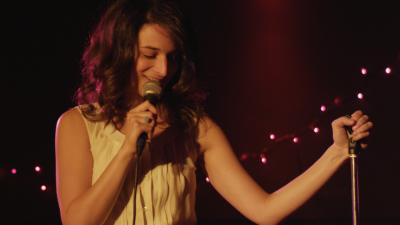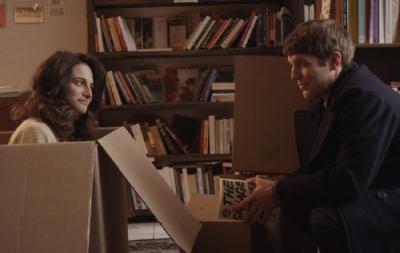By: debbie lynn elias
Gillian Robespierre marks her feature film directorial debut with OBVIOUS CHILD. Based on a short film of the name which she wrote, directed and produced in 2009, Robespierre has expanded the world of protagonist Donna Stern and her adventures as a woe-is-me-my-life-sucks comedienne whose foul mouth and foul humor serve more to alienate the audience than entice, thus creating an uncomfortable and ill-suited dynamic within the film, and almost over-shadowing some of the light that does shine from within.

Self-deprecating, rude, crude comedienne by night and book store clerk by day, Donna Stern is mired in misery. She gets dumped by her boyfriend, finds out the bookstore where she works is closing, meets a cute preppy guy named Max in the club one night , has a one night stand with him and soon finds herself pregnant. How she deals with each of these travesties is the crux of the film.
So let’s talk about Jenny Slate and her performance as Donna. I don’t know if it’s Slate or if it’s the way the character is written but this is one of the most unlikeable characters and performances I have ever seen. You don’t care about Donna at all. She is off-putting and the vulgarity of some of the “humor” would rival Eddie Murphy’s “RAW” days. And it’s not vulgarity that makes Jenny unlikeable; it’s the mean-spirited nature of not only her comedy by the character in general. Given the circumstances created for Donna within the film, the self-pity angle works to a degree, but then it just consumes the film – “Oh, woe is me. I got dumped, I lost my job, I screwed a guy I just met, I’m a closet alcoholic, I don’t want a “real job”, I want to stay a little girl and be protected by daddy, I don’t want to own up to life.” Enough is enough. You never like her. You never care about her. The two things that keep the film going and what are attractive are Jake Lacy as Max and Gaby Hoffman’s Nellie.
Where has Jake Lacy been hiding? What a sweetheart! Likeable almost to a fault, the camera loves him and he exudes pure charm. He’s like Ryan Reynolds and Dane Cook rolled into one with a sweetness and boyish shyness that is a delight. As Max, he gives the film heart and warmth. However, because of Jenny Slate and her performance as Donna, I spent the film wondering why Max kept coming back trying to take Donna out.
While Lacy adds warmth and heart, Gaby Hoffman grounds the film with some great “coming to Jesus” monologues that articulate situations perfectly. Always love Hoffman and her work and here is no different. As Nellie she is a supportive best friend yet looks at everything with black and white practicality. Also engaging is Gabe Liedman as Donna’s fellow comic and gay BFF Joey. A nice touch and while Joey’s stand-up routines are a sad sack routine, they work and he never alienates. Slate’s Donna on the other hand just keeps alienating.
Nice supporting turns by Richard Kind and Polly Draper as Donna’s divorced parents.

Written and directed by Gillian Robespierre, where OBVIOUS CHILD excels is with the matter-of-fact approach to an unplanned/unwanted pregnancy and the peripheral relationships in Donna’s life. A tacit exploration about one woman’s inability to face life, to commit to anything or have any idea what commitment is, Robespierre uses her supporting characters to demonstrate what’s missing in Donna’s life. It’s an interesting tact, but it works and creates a raw energy that is palpable and welcoming (in contrast to Jenny Slate’s Donna).
Gotta give a hand to Chris Teague and his cinematography creating varied and distinct looks but which are cohesive in tone and texture. The warmth of dad’s home with golden glows, the stark whiteness of mom’s kitchen, the dimly it shadowed clutter of Donna’s apartment serving as metaphor to her shadowed life and misery, the vibrancy of the red brick and neon at the club screaming life, the claustrophobic stacks and shelves in the book store. All works well visually subtexturally telling us that the club is the only place where Donna feels alive.
This is a film that would work much better had it remained a short and not been expanded into a full length feature or, in the alternative, a feature that starts with the film’s third act, picking up on Valentine’s Day as Donna and Max head off for an abortion followed by a quiet little slice of life that has hope and kindness as opposed to the vitriole and misery of the prior two acts. There are, however, a few glimmers of hope for the film within the first two acts, i.e., a drunken post-dumping bedroom incessant phone call montage is effective and is something that every dumpee can relate to, but Robespierre doesn’t edit herself and lets the ranting montage go on for too long and loses the inherent relatable comedy. Other effective moments prove to be a father-daughter scene between Kind and Slate, and a mother-daughter scene between Draper and Slate, both of which serve to provide beautiful elements of production design and a showcase for cinematographer Teague.
OBVIOUS CHILD has a lot of potential that obviously isn’t realized.
Written and Directed by Gillian Robespierre
Cast: Jenny Slate, Jake Lacy, Gaby Hoffman, Richard Kind, Polly Draper, Gabe Liedman











